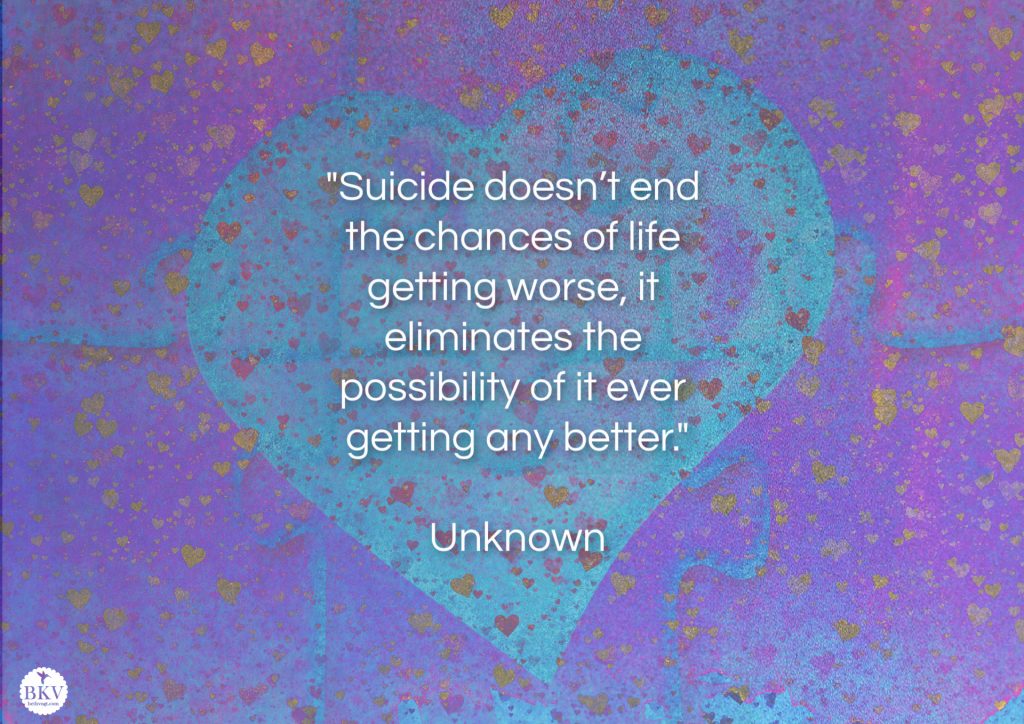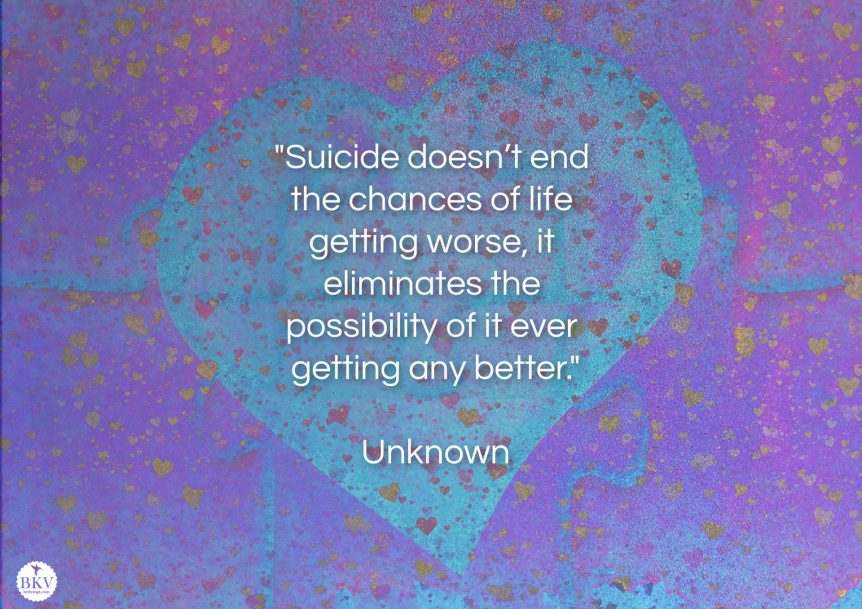@bethvogt
This isn’t the blog post I’d originally written for today.
Seven weeks have passed since my friend’s death by suicide. My sadness is sometimes a dull ache; at other times my heart breaks all over again.
Last night I realized September is National Suicide Awareness Month, also known as Suicide Prevention Month.
I couldn’t ignore the God-prompt to set aside my completely prepared post and talk with you about suicide prevention.
Families and friends separated from loved ones by suicide often wonder, “Why didn’t I know?” or “What more could I have done?” Suicide is a difficult issue because people who are suicidal often don’t talk freely about their struggles. Suicidal thoughts are a formidable foe that often shames and isolates people.
Do you know these statistics about suicide in the United States?
- 10th leading cause of death in the U.S.
- In 2018, 48, 344 Americans died by suicide. There were an estimated 1.4 million suicide attempts.
- On average, there are 132 suicides per day. Another way to look at this: On average, one person commits suicide every 16.2 minutes.
- 54% of Americans have been affected by suicide.
We often talk about how serious a person is about suicide based on whether a person has planned “how” or not. I discovered the recommendation that people struggling with suicidal thoughts develop a “suicide safety plan.”
“When you’re in a crisis situation, it’s not the time to figure out how you’re going to handle it,” said Jill Harkavy-Friedman, a clinical psychologist and vice president of research for the American Foundation for Suicide Prevention. “What a safety plan does is it helps you figure out beforehand a strategy for handling distress.”
Along with writing the plan with someone you trust and sharing copies of your plan with several people you trust – their names and contact information should be listed on your plan – the Suicide Prevention Resource Centers recommends using the list to identify your personal warning signals, such as:
- Increased use of alcohol or drugs
- Withdrawing or feeling isolated
- Talking about being a burden
- Extreme mood swings
Also include ways to distract yourself, including:
- Exercising
- Calling a friend
- Meditating
- Listening to music
Is a safe plan a guarantee against suicide? I wish it was, but no. Suicide and depression are linked, and the combination can increase the likelihood that a person struggles with shame and the inability to be completely honest.
What can we do? We can be available and trustworthy to the ones we love who are hurting. If we see warning signs of any kind, then we reach out. We listen. We pray. If the situation warrants, we offer to help them find professional counseling.
Suicide Lifeline: If you or someone you know may be struggling with suicidal thoughts, you can call the U.S. National Suicide Prevention Lifeline at 800-273-TALK (8255) any time of day or night or chat online.
Keeping the Conversation Going about Suicide https://bit.ly/3clvk7f #NationalSuicidePevention #hope Share on X 'Suicide doesn't end the chances of life getting worse, it eliminates the possibility of it ever getting any better.' Quote by Unknown https://bit.ly/3clvk7f #NationalSuicidePevention #honesty Share on X
Sources:
American Foundation for Suicide Prevention https://afsp.org/
USA Today https://buff.ly/2TZytQy

Comments 11
Suicide hollows out the loved ones left behind who need closure. Yes, sensitive awareness and a loving network is the best safety net.
Author
Dee: The ripple effects of suicide go on and on. And compassionate awareness and support is so needed for everyone struggling with suicidal thoughts.
When my husband was thirteen, his father killed his mother, then shot himself. Tom and his younger brother were sent to live with their married sister, whose husband didn’t want them there. He suffered much from this and still, at times, bears the pain of it. I am so sorry for your loss, Beth.
Author
Oh, Susan, what a horrific tragedy your husband experienced. I am so, so sorry for his loss. And thank you for your compassion, Susan.
For some reason the Bealtes’ ‘Eleanor Rigby’ is brought to mind.
Did she die by her own hand,
dear Eleanor in that hard pew,
and did the Beatles understand
what loneliness could do?
She picked up rice after the weddings,
hoping it might someday be she,
knew there were no happy endings,
but not enough to let it be.
She wore a false-face from a jar
kept by the door, lived in a dream,
but how did those around ignore
this silent awul scream?
Where do they come from, lonely people?
Look in the shadow of your steeple.
Author
Andrew: So often, song lyrics tell true stories …
Beth, I am so sorry for the loss of your friend. This topic is one that needs to be discussed. As our school community walked through the tragedy of four students committing suicide over a three-year span and having loved ones in my life who have considered it, it’s a topic that is often just below the surface in my thoughts. Thank you for sharing the resources and information you did in this post. we need to be aware of how those closest to us are doing. And having some guidance and a plan to help during distressing times is so important.
Author
Jeanne: I had a family member who unsuccessfully attempted suicide. The effects of that still ripple out to this day. And yes, the many topics of mental health need to be addressed more openly.
Hi Beth, I am so sorry for your loss. I appreciate your sensitivity with this topic. January of this year I lost a nephew to suicide.
Author
I’m so sorry for your loss. It’s such a heartbreak, one that ripples out for days, weeks, and years. Praying for you.
Thank you, Beth! I will be praying for you as well.